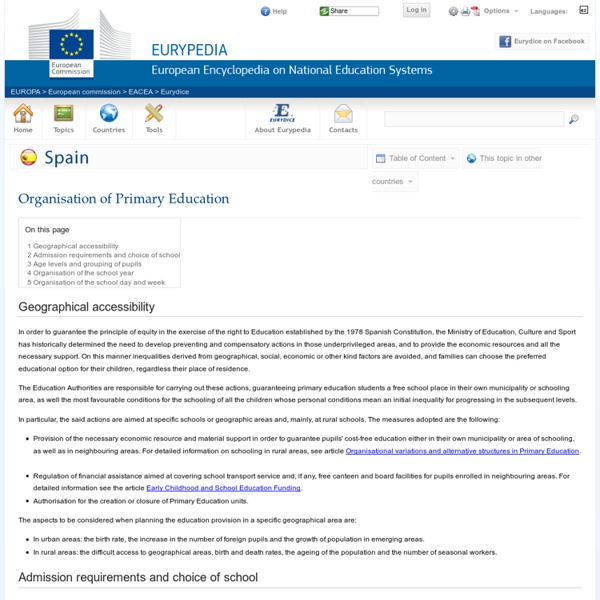Spain:Organisation of Primary Education

Spain:Primary Education
The 2006 Organic Act on Education (LOE) establishes Primary Education as an educational level structured in three cycles each of them made up by two years, studied from 6 to 12 years old. The Spanish Ministry of Education, Culture and Sport (MECD) is responsible for setting the Core Curricula of this level, establishing the common objectives, contents and evaluation criteria for the whole State. The Education Authorities complete these aspects in their concerning management areas. Along with Lower Compulsory Secondary Education (ESO) it constitutes the basic, compulsory and cost-free education of the Spanish Education System. Both levels are aimed at assuring the development of the basic competences: those competences to be acquired by pupils by the end of Compulsory Education in order to be able to fulfil themselves, exercise an active citizenship, satisfactorily take part in adult life and develop lifelong learning. Aim and general objectives Schools providing Primary Education
Spain:Administration and Governance at Local and/or Institutional Level
The 1978 Spanish Constitution established a model of decentralised State by which educational powers are shared between all levels of government. It is a symmetrical model, where the educational powers exercised are basically the same in each and every Autonomous Community. The competences in terms of education are shared between the State General Authority (Ministry of Education, Culture and Sport) and the Autonomous Communities (Regional Ministries or Departments of Education). In the Autonomous Cities of Ceuta and Melilla these competences are assumed by the Ministry of Education, Culture and Sport itself. The role of local authorities is focused on educational management through the Education Departments or Municipal Education Institutes. With this decentralisation model, the curriculum is formulated in a set of levels of application: Levels of curricular development Source: Drawn up by Eurydice Spain-REDIE from the regulations in force. Administration and governance at local level
Spain:Primary Education
The 2006 Organic Act on Education (LOE) establishes Primary Education as an educational level structured in three cycles each of them made up by two years, studied from 6 to 12 years old. The Spanish Ministry of Education, Culture and Sport (MECD) is responsible for setting the Core Curricula of this level, establishing the common objectives, contents and evaluation criteria for the whole State. The Education Authorities complete these aspects in their concerning management areas. Along with Lower Compulsory Secondary Education (ESO) it constitutes the basic, compulsory and cost-free education of the Spanish Education System. Within the framework of the proposal made by the European Union, the MECD has identified eight basic skills: Aim and general objectives The LOE and the Royal Decree establishing the core curricula of Primary Education express the general objectives of this educational level: Schools providing Primary Education Education Policy
Spain:Overview
The Spanish education system It comprises the education authorities, education professionals and other public and private actors who perform regulatory, financing or service provision functions for the exercise of the right to education in Spain, and those entitled to such a right, as well as the set of relations, structures, measures and actions being implemented in order to ensure it. It is in the early stages of a reform process since the Act on the Improvement of the Quality of Education, which modifies, to a limited extent, the 2006 Education Act, was passed in 2013. The reform, on a general framework of stability, is presented as an ongoing process as weaknesses are detected or new needs arise in the education system. This reform recognises the need to combine quality and equity in the training provision, considering that school enrolment is not enough to meet the right to education, but quality is a constituent element of that right. Pre-primary education is up to 6 years of age.
Related:
Related:



